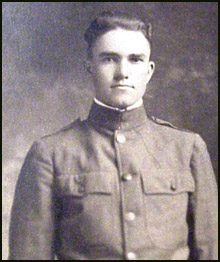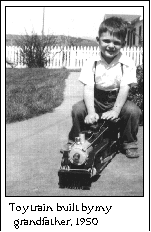Father: William Rufus WARNER
Mother: Cora Lee HOLLAND
Family 1 : Ruth Esther BURNSIDES
_David Samuel WARNER ___
_George Wylie WARNER ____________|
| |_Francis LANGFORD ______+
_William Rufus WARNER _|
| | ________________________
| |_Bell BROWN _____________________|
| |________________________
|
|--William Wiley WARNER
|
| _James HOLLAND _________
| _William Henry Harrison HOLLAND _|
| | |_Jane RED ______________
|_Cora Lee HOLLAND _____|
| _Edward Ausburn WRIGHT _+
|_Sarah Elizabeth WRIGHT _________|
|_Rebecca CHAPPELL ______+
![]()
Notes:
Was known as William Warren for some unknown reason by his mother-in-law, and "Uncle Warn" by other Burnsides descendants.
 |
 |
| Picture in Laura Nell Brewer's collection | |
My grandfather did not have much of a childhood, and started working at an early age like they all did back then. Like his cousins and with the aid of his Aunt Daisy Neely, he attended (worked his way through) John Brown College for a period of time.

When he got older and out on his own in his late teens,
he went to work for a railroad-owned chain of restaurants for a period of time.
After getting married, he had planned to open a cafe in Kensett, where his
parents were living at the time. Instead he went to work for the Missouri and
Missouri-North Arkansas Railroad (M. N. & A.) doing things like cleaning
out cars, shoveling coal for 25 cents an hour, as well as some mechanical and
machinist work. He did that for over the next ten years. During this time, the
family lived in either Kensett or Helena where the company had corporation
yards. The family moved often and my mom remembers being burned out of their
home a few times as well. During lay-off times, Grandpa would work in the
cotton fields and on house construction to support his family.
Always in search of a "better life," my
grandfather took a trip around 1936 to California to see if there were any
better jobs there. He lost his rail pass somewhere in Texas and had to "hobo"
his way back to Kensett. When he returned home, my mother and her sisters where
all in bed sick. However, Grandma went out and wrung the neck of an old chicken
and cooked it up. As tough as that old bird was, my mom remembers it as one of
the most memorable meals of her childhood. "Everyone got well after that!" she
said.
In 1937, his mother-in-law, along with her
son Virgil and her daughter
Helen moved to California to be near her
another son, Raymond. Raymond was working at a
CCC camp near Madera and Merced. Raymond's future wife, Willie, also came out
with them, and they got married soon after. Grandpa brought his whole family
out to California to visit them, and to look for work again. They could travel
very cheaply by rail because of his railroad job. Grandpa found some work to do
in the Merced area, and his family also stayed for awhile with mother-in-law's
cousin, Phillip Allen, who lived in Oakhurst,
near Yosemite.
They also visited Napa during
this time. Phillip Allen's mother, Balzoria
(and my grandfather's mother-in-law's aunt) lived there and Raymond and his
mother were in the process of moving there. A photo post card exists of the "S.
P. Bridge -- Martinez to Bodega, Calif." and dated "6/1/37" from Crockett,
California which my grandfather had sent to his parents back in Harrison,
Arkansas:
We are still in the gold state
stayed 2 days in Napa found a lot of work it is just opening up, sure are
having a great time. Ruth fell in love with Napa. Will start home some time
soon will see you again soon. Wiley.
However
much they may have liked Napa, there was not the kind of work there at that
time which my Grandpa was satisfied with. He picked up an application at Mare
Island Naval Shipyard in Vallejo, about 20 miles south of Napa, and filled it
out in hopes that something would pan out. In a story which I often heard as a
child, he then gathered the family together and, though Grandma would have
preferred to stay, he flipped a nickel to decide if they should try to make a
go of it in California or go back to Arkansas. A group decision handed over to
the suspect forces of chance, the coin landed on the "go back" side. They
returned and bought a small house on the school yard grounds in Kensett.

As fate would switch back
and have it, Grandpa soon got a call that he could have a job at Mare Island,
if he could show up to work within four days. Now this was finally a gamble he
was willing to take. They sold or gave away everything, bought a car on credit
(from a Mr. Angel "on just a handshake" according to the story), and my
grandparents, their three daughters, and a dog named "Grumpy" moved to Napa all
within the necessary four days.
He worked
through out World War II at Mare Island. After being laid off with the War's
end however, the Warner's all "got a fit to go to Oregon", as my grandmother
put it. Grandpa thought he could finally be a success up there by taking up
farming. By then, Mom was married and had enough of moving to fill a life time
and stayed behind (living in the same house for close to 53 years now). A
single car stuffed with Warners made the trip. It included my grandparents, my
great grandmother, Cora Warner, Aunt Clara (my mother's youngest sister who was
still a teenager), Aunt Bess & Uncle Howard (the older sister who was also
married -- Howard's parents were already living in Oregon), Donnie (their son
and my cousin), and old "Grumpy" the dog. Several other members of the
Burnsides clan were already up there or eventually joined them around Falls
City, Oregon. One of my earliest memories is of taking a train and visiting
them there when I was around three years old. About five years after their move
to Oregon, my grandfather heard that Mare Island was hiring again and he
decided that he had enough of farming and Oregon, so they moved back to Napa,
bringing Grandmother Warner and Aunt Clara with them.
When I was growing up in Napa, California, my
grandfather worked as a "Calker" and a "Chipper" among other things at the Mare
Island Naval Shipyard in Vallejo. He would fix the mistakes of others, such as
grinding pieces of welded metal down which did not pass X-ray inspection so
that the joints could be rewelded (hopefully correctly this time). My brother,
remembers our grandfather going through a package of razor blades while
attempting to shave. The emory grinding compound which he used was so embedded
into his skin that it would quickly dull the blades. He helped build some of
the earliest nuclear submarine which were made in this country. He put in a lot
of lead and asbestos inside of the nuclear reactor cores. This kind of work and
all the coal dust he must of breathed while working on the railroad in Arkansas
was undoubtedly the cause of his emphysema in later life. He probably could
have filed a workman's compensation case with Mare Island, though this was also
during a time when restitution for a job-related illness was not considered as
something which a single worker could pursue or even conceive of attempting. He
became ill and took an early retirement in 1967. His last years were spent in
Yountville, CA.
Besides fishing and "frog huntin'," my grandfather had a long-time interest in trains and made train toys for his grand children in the nineteen fifties from things like discarded tin cans and cigar box wood.

![]()
This page created on 04/23/00 01:33:20 . Updated 10/20/02 11:56.